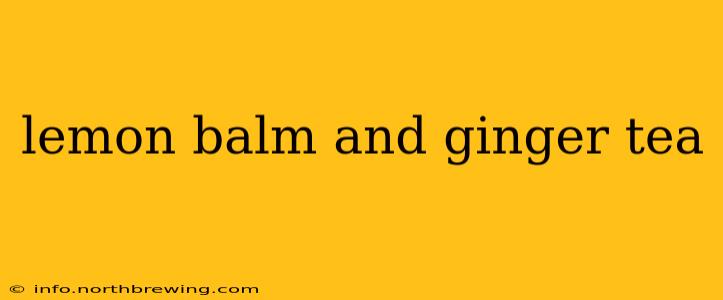Lemon balm and ginger tea offers a delightful fusion of flavors and potential health benefits. This comforting beverage combines the calming properties of lemon balm with the invigorating zing of ginger, creating a brew that's perfect for relaxation and wellness. This article delves into the benefits of each ingredient, explores how to prepare this flavorful tea, and addresses common questions surrounding its use.
What are the Benefits of Lemon Balm?
Lemon balm, a member of the mint family, has been used for centuries for its purported medicinal properties. Its calming effects are often attributed to its rosmarinic acid content, which may have anti-inflammatory and antioxidant properties. Studies suggest that lemon balm may help with:
- Stress and anxiety reduction: Some research indicates that lemon balm may help reduce feelings of stress and anxiety. More research is needed to confirm these findings, however.
- Improved sleep quality: Its calming nature may promote relaxation and improve sleep quality for some individuals.
- Cognitive function: Preliminary studies suggest potential benefits for cognitive function, particularly in older adults, but more robust research is required.
- Improved mood: The calming effects of lemon balm could contribute to improved mood and a sense of well-being.
What are the Benefits of Ginger?
Ginger, a rhizome with a pungent aroma and spicy taste, is renowned for its potential health benefits. Its active compounds, such as gingerols and shogaols, are thought to be responsible for its various effects. These include:
- Anti-inflammatory properties: Ginger exhibits powerful anti-inflammatory effects, which may help reduce pain and inflammation in the body.
- Nausea relief: Ginger is a well-known remedy for nausea, particularly morning sickness and nausea associated with chemotherapy.
- Improved digestion: It can stimulate digestion and help relieve symptoms like bloating and gas.
- Enhanced immunity: Some research suggests ginger may boost the immune system, though further studies are needed.
How to Make Lemon Balm and Ginger Tea?
Making this soothing tea is simple. You can use fresh or dried herbs.
Ingredients:
- 1 cup of boiling water
- 1 teaspoon dried lemon balm (or 2 teaspoons fresh)
- 1 inch piece of fresh ginger, thinly sliced (or ½ teaspoon dried ginger)
- Honey or other sweetener (optional)
Instructions:
- Pour boiling water over the lemon balm and ginger in a mug or teapot.
- Steep for 5-10 minutes, or longer for a stronger flavor.
- Strain the tea and add honey or another sweetener if desired.
Is Lemon Balm and Ginger Tea Good for Anxiety?
While both lemon balm and ginger possess properties that may indirectly help manage anxiety symptoms, it's crucial to remember that tea is not a replacement for professional medical treatment. The calming effects of lemon balm and the overall wellness benefits of ginger might contribute to a sense of relaxation and help manage mild anxiety symptoms for some individuals. However, if you're experiencing significant anxiety, consult a healthcare professional for appropriate guidance and treatment.
Can I Drink Lemon Balm and Ginger Tea Every Day?
Generally, consuming lemon balm and ginger tea daily in moderation is considered safe for most people. However, it's always wise to listen to your body. If you experience any adverse effects like digestive upset or allergic reactions, discontinue use and consult a healthcare provider. Pregnant or breastfeeding women should consult their doctor before regularly consuming herbal teas.
Does Lemon Balm and Ginger Tea Interact with Medications?
Some herbs can interact with certain medications. While lemon balm and ginger are generally considered safe, it's essential to consult your doctor or pharmacist if you are taking any medications, particularly blood thinners or medications affecting the nervous system, before incorporating this tea into your regular routine. This ensures you avoid any potential adverse drug interactions.
Is Lemon Balm and Ginger Tea Good for Sleep?
The calming effects of lemon balm might contribute to better sleep quality for some people. Ginger, while not directly known for its sleep-promoting effects, contributes to overall well-being, which can indirectly improve sleep. However, the effects vary from person to person. If you have chronic sleep problems, it's always advisable to seek professional advice from a healthcare provider.
Conclusion:
Lemon balm and ginger tea offers a delicious and potentially beneficial beverage. The combination of calming lemon balm and invigorating ginger creates a comforting and flavorful experience. While this tea may offer several health benefits, remember that it shouldn't replace professional medical advice or treatment for serious health conditions. Enjoy this comforting brew responsibly, and consult your doctor if you have any concerns.
